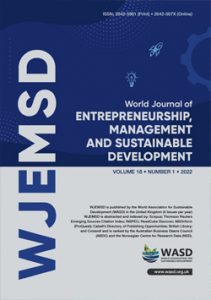Knowledge absorptive capacity: do all its dimensions matter for export performance of SMEs?, Dr. Godwin Ahimbisibwe, Stephen Nkundabanyanga, Gideon Nkurunziza and David Nyamuyonjo
Dr. Godwin Mwesigye Ahimbisibwe , Stephen Korutaro Nkundabanyanga, Gideon Nkurunziza, David Nyamuyonjo
, Stephen Korutaro Nkundabanyanga, Gideon Nkurunziza, David Nyamuyonjo
Makerere University Business School, Kampala
Uganda
DOI: 10.1108/WJEMSD-09-2015-0041
Purpose: In this paper we aim to study the relationship between knowledge absorptive capacity (KAC) of exporting SMEs in Uganda and their export performance.
Design/methodology/approach: This study is correlational and cross-sectional, and adopts firm-level data collected via questionnaires from Ugandan exporting SMEs. As we use the sub-domains of KAC to predict export performance and therefore these sub-mains are expected to be correlated, we apply hierarchical regression as an appropriate tool for analysis when variance on a criterion variable is being explained by predictor variables that are correlated with each other (Pedhazur, 1997). Using this tool we analyze the effect of a given sub-domain after controlling for other indicators (sub-domains) of KAC; a “control” achieved by calculating the change in the adjusted R2 and the significance of this change.
Findings: We find that only external knowledge acquisition (a dimension of potential absorptive capacity) and external knowledge application (a dimension of realised absorptive capacity) are the only significant predictors of export performance in our model. Contrary to previous thinking, we find that external knowledge assimilation and transformation are not significant predictors of export performance. Taken together, our independent variables explain about 35.4 percent of the variance in export performance of SMEs in Uganda.
Research limitations/implications: The use of hierarchical regression is susceptible to problems associated with sampling error. However, the likelihood of these problems is reduced by our interaction with the data Practical implications – Our results imply that the initial focus of exporting SMEs should be on external knowledge acquisition and application.
Originality/value: Unlike most of the export performance literature, which have focused on the general effect of knowledge absorptive capacity as a global variable, this study explores the role played by the four dimensions of KAC and methodologically isolates the contribution played by each individual dimension in the context of exporting SMEs in a developing nation. As such we uncover the reality that not all the sub-domains of KAC are significant for export performance of SMEs in a developing country context.
Citation: Ahimbisibwe, G.M., Nkundabanyanga, S.K., Nkurunziza, G. and Nyamuyonjo, D. (2016), "Knowledge absorptive capacity: do all its dimensions matter for export performance of SMEs?", World Journal of Entrepreneurship, Management and Sustainable Development, Vol. 12 No. 2. https://doi.org/10.1108/WJEMSD-09-2015-0041

